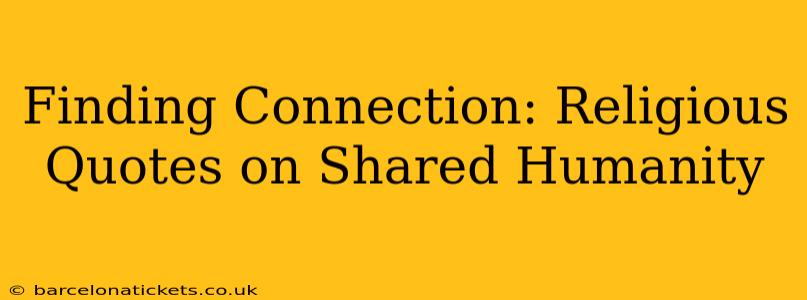In a world often fractured by division, religious traditions offer a powerful counterpoint: a resounding affirmation of our shared humanity. Across diverse faiths, the emphasis on compassion, empathy, and interconnectedness underscores our fundamental unity. This exploration delves into poignant religious quotes that highlight this shared human experience, transcending religious boundaries and fostering a deeper understanding of our common bonds. We'll examine how these quotes not only express a spiritual truth but also provide a practical framework for building a more inclusive and compassionate world.
What are some examples of religious quotes about the brotherhood of mankind?
This question probes the core of the shared humanity concept. Many religious texts emphasize the inherent equality and brotherhood (or sisterhood) of all people, regardless of background or belief. Here are some examples:
-
Christianity: The parable of the Good Samaritan (Luke 10:25-37) beautifully illustrates the principle of loving your neighbor, extending compassion beyond your immediate circle to encompass all humankind. The message transcends religious affiliation, focusing on shared humanity and the obligation to act charitably toward everyone. Furthermore, Galatians 3:28 states, "There is neither Jew nor Gentile, neither slave nor free, nor is there male and female, for you are all one in Christ Jesus." This verse directly challenges societal hierarchies and emphasizes the ultimate equality of all individuals in the eyes of God.
-
Islam: The Quran repeatedly emphasizes the concept of human equality and the importance of treating everyone with justice and kindness. Surah Al-Hujurat (49:13) states, "O mankind, indeed We have created you from male and female and made you peoples and tribes that you may know one another. Indeed, the most noble of you in the sight of Allah is the most righteous of you." This verse highlights that righteousness, not lineage or social status, is the measure of a person's worth. The emphasis on compassion and social justice throughout the Quran promotes a vision of a society where everyone is treated with dignity and respect.
-
Buddhism: The concept of interconnectedness (pratītyasamutpāda) is central to Buddhist philosophy. All beings are seen as interconnected and interdependent, sharing a common fate. The Four Noble Truths and the Eightfold Path emphasize compassion and the elimination of suffering for all sentient beings. The idea of universal compassion, karuna, underscores the inherent value and dignity of every living creature. While not explicitly stated as a quote, this deeply ingrained principle informs Buddhist teachings and practice, encouraging individuals to act with kindness and empathy towards all.
-
Hinduism: The Bhagavad Gita, a central scripture of Hinduism, emphasizes the concept of Atman, the eternal self, which is part of the universal Brahman. This implies that all beings are fundamentally connected and share a divine essence. The principle of ahimsa (non-violence) underscores the importance of respecting all life forms and avoiding causing harm to others. The emphasis on dharma (righteous conduct) and karma (actions and consequences) further promotes a moral framework that prioritizes the well-being of all.
How do religious quotes promote social harmony?
Religious quotes promoting shared humanity act as powerful tools for building social harmony by:
- Challenging prejudice and discrimination: By emphasizing the inherent equality of all people, they directly counter harmful prejudices based on race, religion, gender, or other factors.
- Inspiring empathy and compassion: The focus on love, kindness, and compassion encourages individuals to see others as fellow human beings deserving of respect and dignity.
- Promoting peaceful conflict resolution: The emphasis on justice, fairness, and understanding provides a framework for resolving conflicts peacefully and constructively.
- Strengthening community bonds: The shared belief in a common humanity fosters a sense of belonging and connection, strengthening community ties and promoting social cohesion.
These quotes, therefore, serve not just as spiritual pronouncements but as practical guides for building a more just and equitable world.
What role do religious leaders play in fostering a sense of shared humanity?
Religious leaders have a crucial role to play in promoting a sense of shared humanity. Their influence on their followers is significant, and their teachings and actions can greatly impact attitudes towards others. Responsible religious leaders:
- Interpret religious texts inclusively: They emphasize the passages that promote unity and compassion, while carefully addressing or contextualizing those that may be interpreted as exclusionary.
- Speak out against injustice and discrimination: They use their platforms to condemn prejudice and discrimination, advocating for the rights and dignity of all people.
- Promote interfaith dialogue and cooperation: They actively engage with people of other faiths to build bridges of understanding and cooperation.
- Lead by example: They demonstrate compassion, empathy, and respect in their personal lives and actions.
By fulfilling these roles, religious leaders can be powerful agents for change, inspiring their followers to embrace a vision of shared humanity and work towards a more just and peaceful world.
This exploration only scratches the surface of the wealth of religious teachings on shared humanity. The quotes and principles discussed offer a starting point for a deeper reflection on our interconnectedness and the profound responsibility we share in building a more compassionate and inclusive world.

